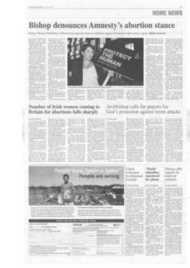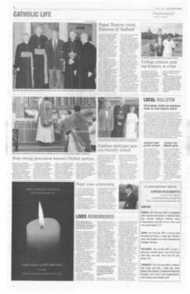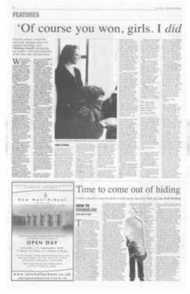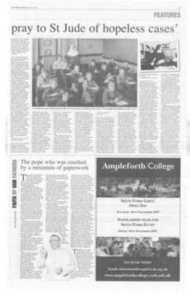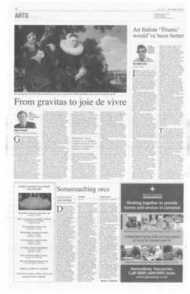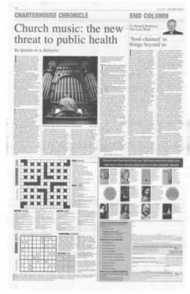Page 9, 6th July 2007
Page 9

Report an error
Noticed an error on this page?If you've noticed an error in this article please click here to report it.
Tags
Share
Related articles
Patron Of The Hopeless
Novena To St. Jude
The Deaf Nun Who Heard The Children In Need
An Irreplaceable Kind Of Loving
Return To Sender A Tale Of Love And Lust
pray to St Jude of hopeless cases'
-nip pump. I have nothing but praise for the nuns 1 have known. They gave me a strong faith, a determination to be a good teacher, and, above all, a desire to be as good an influence on others as they were on me. Marie Caltieri , West Yorkshire I HAD THE very good fortune of being a boarder in the 1940s at St Leo's Mercy Convent in Carlow, Ireland. At the tender age of 16 I fell head-over-heels in love with one, a certain very handsome 21-year-old, Jim Leahy from the Millstream, Abbeyfeale, County Limerick. Just like the Oisin of hr Na N-Og, "he was pure of heart, fleet of foot and strong of limb-, but the romance was brought to an abrupt halt when he decided to try his hand at poetry. Every week I was the proud recipient of an epistle very wisely signed: "Your loving cousin, Jim." Why wisely? Because Mother Gonzaga, who perused all boarders' incoming correspondence, "had her eye" on me and didn't for one moment believe that he was a cousin but couldn't exactly prove it until the "Pome" arrived and then the fat was truly in the fire. It ran thus: "I wish you were a little duck aswimining on a lake, and I aswimming by your side, a happy little drake." With pursed lips she scanned the script and then, pulling herself up to her full five feet two, yelled: "This man is no cousin of yours and I will not tolerate literature of doubtful nature!" And so, tearfully and regrettably, "Cousin Jim" passed out of my life forever and, I sincerely hope, lived happily ever after.
Anita Kilbride-Jones, St Paul's Bay, Malta [TIM AUTHOR was a boarder at Loreto Convent in Llandudno, North Wales (1940-51)1 Every morning, at Mass at 7 am. one of the girls, once Latin pronuncia lion had been perfected, "answered" Mass from a prie-dieu at the foot of the altar in those days girls did not go on to the altar at all. One particular morning, when I was getting up rather slowly and reluctantly, I saw the canon coming up the drive and knew that, unless I really hurried, I would be late at my place to answer Mass. So I dragged on my clothes and shot off to chapel, answered Mass correctly and then we all went to the refectory for breakfast. We had just sat down when Mother Superior walked in and we all stood. "No girls, please be seated, but Verney Donnelly, remain standing." She then addressed me. "I am undone," she announced. I had no idea what she meant. Was her habit undone, her veil, her rosary? I must have looked blank, because she then informed me that in the house of God I had dared to answer Mass with my stockings rolled down by ' my ankles a moment in my life I have never forgotten, when I was truly mortified.
How many of us remember the occasions when we were to have a film at school? It was a moment of immense excitement. We would sit in rows in our concert hall, while the projector and screen were set up and the evening would begin. However, on one occasion, it seemed as though the film was a country film without a particular storyline, and suddenly we saw the birth of a lamb. A hand shot across the projector, and when we should have been protected from such a sight, it was too late the damage was done. We innocents had learned our first lesson on procreation. On another occasion we watched a film, which I think was called Springtime it sounded innocent enough. The nuns did veto the films, we thought, but during this one, two young lovers kissed. Too late again the hand shot across the projector, but the girls had already seen the kiss and learned how it was done. Verney Sergeant, by e-mail NUNS ARE FANTASTIC and how we miss them now in education. I was educated by nuns between 1947 and 1952. To be sent over to boarding school at the age of 11, away from home, was not a good start but I always found the nuns helpful and understanding. Perhaps we were lucky with the teachers we had. Our English teacher had been a Shakespearean actress before she entered the convent. Our music teacher had been a concert pianist. We had one young nun who had been a very good tennis player and she used to hook up her voluminous skirt and tie up her heavy rosary beads (this was before the nuns' habits were modernised) and play very good tennis with us, but it was agony for us to feel, watching her play, how well she would have been able to play without all the encumbrances.
Over the years I have heard stories of girls who disliked the nuns or found them overpowering, but I never found anything but encouragement and friendliness, though maybe it did take me a little while after leaving school to realise how lucky I was. The nuns had so much time for us, whereas nowadays the lay teachers obviously have their own home life to cope with and therefore when the school bell goes that's the end of school until the next day.
Daphne Dillon, Dublin I WAS EDUCATED by Ursuline nuns in Guyana (then a British colony, British Guiana) from the age of five to 17 (1952-64).
Being "at the convent" gave a sense of security we girls grew up knowing we were privileged to be having this good, private education at one of the best schools in the country. There was also a sense of being "special" because we were Catholics. This has left some of us with a kind of "Catholic snobbery" which I, for one, have had to work on in order to become more accepting of other denominations and religions successfully, I am glad to be able to say.
I remember, aged five, sitting next to Johnny Carpenter (boys attended until they were seven) in class, saying, "roses are red, violets are blue, sugar is sweet and I love you" to each other. To talk in class was against the rules so we were sent to Mother Mildred (our headmistress), who made us kneel in front of her desk for about half an hour.
Skip to Prep 3 aged 10 and darling Mother Richard, a wonderful American nun. She loved us all and taught us well. She inspired us by her very presence and initiated the making of a triangular garden at the centre of which was a beautiful statue of Our Lady. One night vandals climbed the walls into the school playground, trashed the garden and smashed the statue. Mother Richard was devastated and we did not see her all day. When we did she was subdued and what a shock to us girls to see a nun cry. She and I wrote to each other from time to time until we lost touch in the 1980s; the last time I heard from her she was very unwell.
Skipping forward to high school, with different nuns (still at the same convent), one memory we still speak of, in our very late 50s and early 60s, is of Mother Margaret telling us (aged 15) that she knew we went to parties with the boys from the Jesuit college, and that if the car was full we must "put a book" before we sat on a boy's lap. (She later left the convent, married and had four children.) I remember being in the school choir when I was in the fifth form and taking part in the Guyana school choir competition. One of the songs was Robert Burns's "My Love is Like a Red, Red Rose". We won only to have this victory dampened somewhat by our headmistress saying: "Well girls, I prayed to St Jude of hopeless cases." Brenda Bayne. by e-mail
blog comments powered by Disqus




